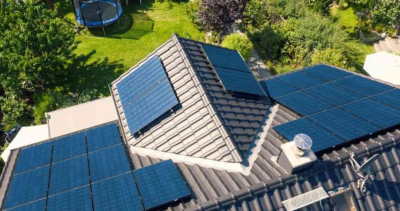Solar energy system owners always want to install a solar energy storage system so that they can use solar energy during power outages or at night. In short, the system stores the solar energy you capture for later use, making the entire solar energy system more efficient and convenient to use.
That being said, there are many benefits to installing a solar energy storage system at your home or workplace, some of which we will cover now.


Solar energy system owners always want to install a solar energy storage system so that they can use solar energy during power outages or at night. In short, the system stores the solar energy you capture for later use, making the entire solar energy system more efficient and convenient to use.
That being said, there are many benefits to installing a solar energy storage system at your home or workplace, some of which we will cover now.

Lower Electricity Bills:
Because you can switch to stored solar energy at night, the reduction in your electricity bill is obvious. While this does not mean that you can live an off-grid life, having a solar energy storage system with a larger capacity is a good investment, depending on your daily energy usage.
Better Energy Independence:
Many people do not like to rely on grid electricity. With a solar energy storage system, your home's energy needs can be met. If you have a modular system, you can gradually add solar panels and battery banks, further improving your energy independence.
Reduced Carbon Footprint:
If you live in an area with a lot of coal-fired power generation, using a solar energy system with energy storage may significantly reduce your home's carbon footprint. Coal-fired power plants release a lot of greenhouse gases. Nuclear power plants release the least amount of greenhouse gases, but people are always very concerned about radioactive waste.
Improves Property Value:
Solar storage systems make your solar system more practical and versatile. It changes the way you get and use your daily electricity. This is a great topic to talk about with potential homebuyers. If the system saves you a lot on your electricity bill, it can be an attractive proposition for people to buy your home.
Contributes to the grid of the future:
In many countries, the use of solar energy storage systems is still in its infancy. However, it is only a matter of time before these energy storage devices become more common. Improvements in manufacturing processes will make battery devices more affordable for the average household. If millions of households have solar panels and battery devices, a smart grid can be developed. Households can contribute to the generation of electricity across the country to meet demand during peak hours, especially at night.
Advantages of solar energy:
- The biggest feature of solar energy is its huge energy. On Earth, no energy source can compare with solar energy. Solar energy is the radiation energy released by the high-temperature nuclear fusion reaction inside the sun. The solar radiation energy reaching the earth's surface every year is about 130 trillion tons of standard coal, which is equivalent to 10,000 times the total energy consumed by the world every year.
- Solar energy has typical regenerative properties and is a typical renewable energy source. Moreover, it is precisely because of the renewability of solar energy that the renewability of almost all other renewable energy sources is determined. In other words, the renewability of almost all other renewable energy sources comes from the renewability of solar energy.
- Solar energy is long-lasting in time, and for humans, it can be said to be permanent and unlimited.
- Solar energy is widespread, and almost all of the earth's surface is illuminated by sunlight.
- Solar energy is a completely clean energy source that does not emit any polluting gases or harmful substances.
- Solar energy is the only energy source that can maintain the balance of atmospheric temperature without causing climate warming.
- Solar energy is the safest and most reliable energy source.
- The development and utilization of solar energy can fully maintain the balance of nature.
- The application of solar energy is not limited by mining, transportation and storage conditions.
Solar cells are devices that convert light energy into electrical energy and have a wide range of applications. At present, solar cells have been widely used in household and industrial fields, including home photovoltaic power generation systems, solar water heaters, mobile device charging, etc.

The use of solar cells is becoming more and more common, mainly due to the following factors:
- Renewable energy: Solar energy is renewable and clean energy. Compared with traditional fossil fuels, it does not produce greenhouse gases and air pollutants and is environmentally friendly.
- Cost reduction: With the advancement of technology and the scale effect, the manufacturing cost of solar cells continues to decline. This makes solar cells gradually more affordable and can compete with traditional power generation methods in many regions.
- Policy support: Many countries have introduced policies and measures to encourage the development of renewable energy, such as subsidy policies and tax incentives. These policy supports provide a good development environment for the solar energy industry. In the future, the prospects for solar cells are very broad. With the continuous advancement of science and technology, the conversion efficiency of solar cells will be improved and the manufacturing cost will be further reduced. At the same time, the development of battery energy storage technology will also increase the reliability and stability of solar cell systems. With the improvement of global awareness of environmental protection and the growth of demand for renewable energy, solar cells are expected to gain a larger market share in the future. At the same time, solar cells can also be used in combination with other emerging technologies, such as smart grids, energy storage, etc., to provide a more sustainable and clean solution for the entire energy system.
In short, as a green and renewable form of energy, solar cells have great potential in terms of usage and future prospects. Through technological innovation and policy support, we have reason to believe that solar cells will play a more important role in the future and create a cleaner and sustainable future for mankind.


